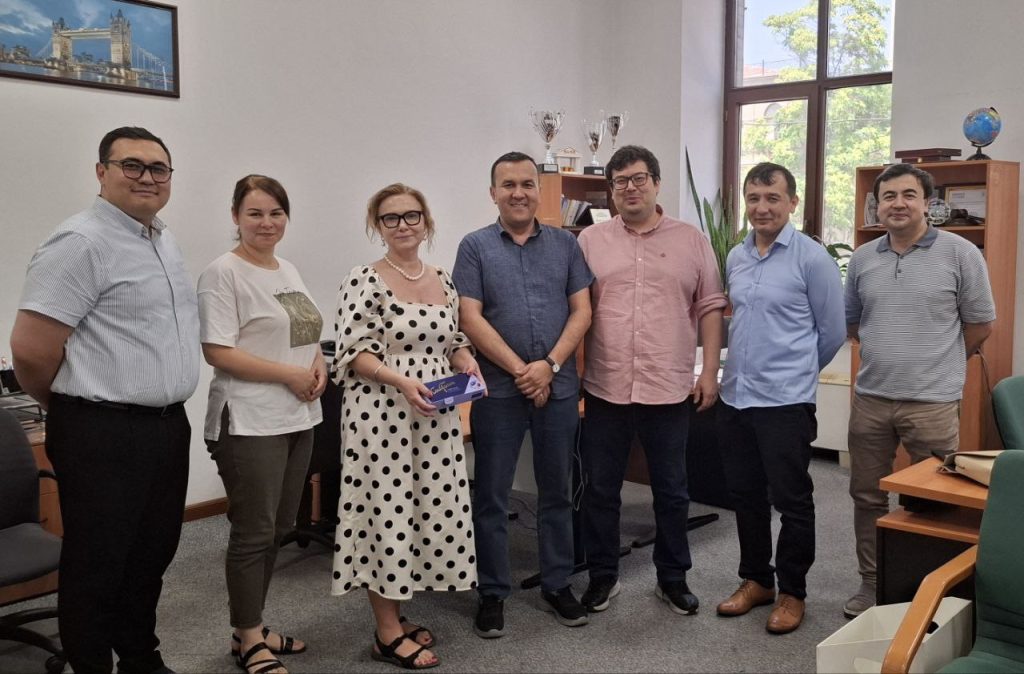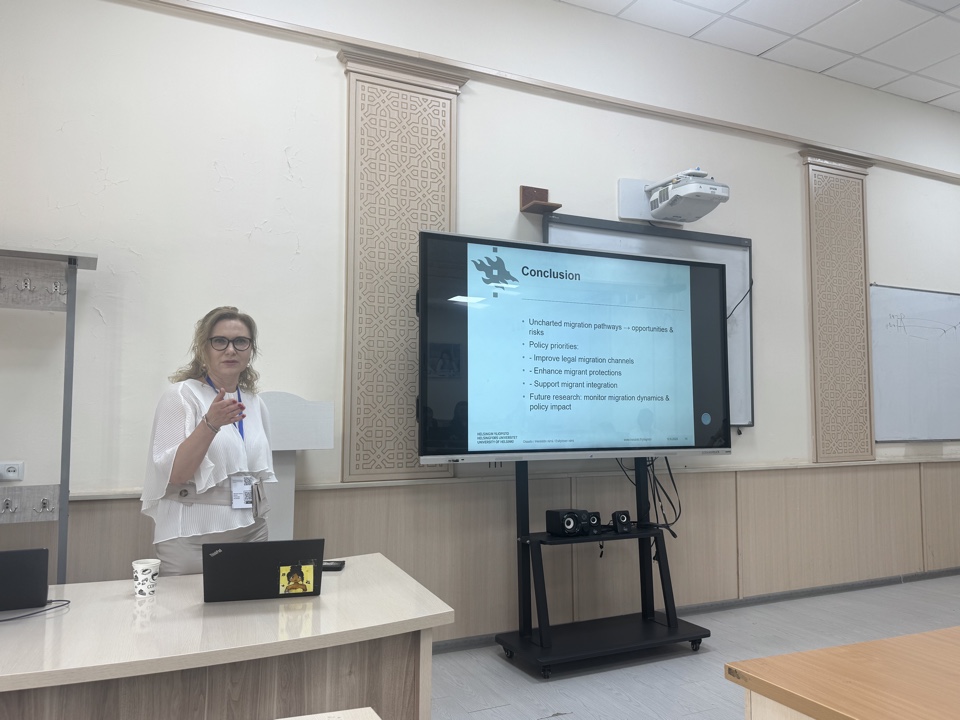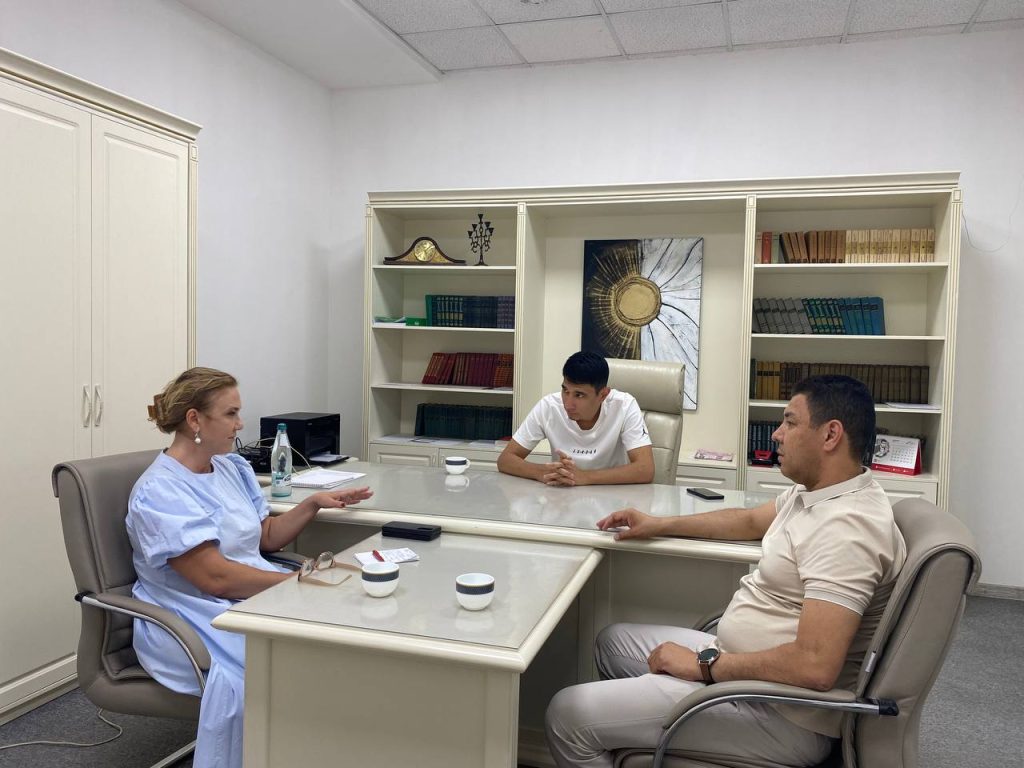by Dr. Larisa Kangaspuro, University of Helsinki
Between 29 May and 10 July 2025, I was a visiting researcher at Westminster International University in Tashkent (WIUT), Uzbekistan’s first Western-style university, offering British-accredited degrees in partnership with the University of Westminster. My aims were straightforward: to collect data, conduct fieldwork, and strengthen academic ties in Tashkent and beyond.
I am especially grateful to the WIUT School of Law, Technology & Education. Under the leadership of Alisher Pulatov and Musojon Rizoyev, the team combines rigorous legal scholarship with hands-on engagement with practice. The professionalism and kindness of the faculty set a high bar for academic hospitality in the region.

WIUT, Law School academic staff. Photo by Larisa Kangaspuro.
What I worked on
This secondment forms part of my broader study, “Preparing for Finland: Migration Strategies and Institutional Challenges in Uzbekistan.” I examine how prospective labour migrants plan moves to the Nordic–Baltic region—especially Finland—and how they navigate formal procedures and informal practices shaped by bureaucracy and integrity risks.
To ground the analysis, I combined desk research (government and NGO portals, media, and widely used Telegram channels) with six in-depth interviews with representatives of state bodies, NGOs, international organisations, and legal experts. All interviews were conducted in Russian; informed consent was obtained in Russian. I applied a two-step anonymisation protocol from transcription through analysis.
What I learned (so far)
Discussions with officials and practitioners confirm that information ecologies—from official webpages to Telegram groups—are central to how people assess routes, costs, and risks. At the same time, institutional frictions (documentation, certification, language) create openings for informal “help,” where integrity risks can emerge. These insights inform my forthcoming article, “From Facilitation to Exclusion: Migration Regimes and Uzbek Labour in the Baltic and Nordic States,” which I intend to submit to REGION (peer-reviewed journal published by the Institute of Russian Studies at the Hankuk University of Foreign Studies, South Korea).
Sharing and connecting
A highlight was the ESCAS 2025 regional conference in Tashkent and Samarkand (12–14 June) — valuable venues to test early arguments and compare notes across Central Asia. I presented “Uncharted Pathways: Labour Migration from Central Asia to the Baltic and Nordic Countries” at the Tashkent State University of Economics (TSUE) in Tashkent and chaired the session “Margins of the State: Refugees and Returnees” at the TSUE Samarkand branch.

Larisa Kangaspuro delivering her presentation. Photo by Larisa Kangaspuro.
Back at WIUT, on 30 June I led a staff workshop designed to encourage submissions to a forthcoming REGION special issue on Central Asia, for which I will serve as guest editor.
Beyond academia
I met with counterparts in the policy and practitioner space, including former and current stakeholders at the Migration Agency under the Cabinet of Ministers, members of the Public Council under the Agency, and colleagues from MIGRANT INFO, Migrant.uz, and IOM Uzbekistan. These exchanges helped triangulate institutional perspectives with experiences of migrants and intermediaries on the ground.

Left to right: Larisa Kangaspuro, Botirjon Shermukhammad (head of MIGRANT INFO, Tashkent), Sherzod Eraliev (Senior Researcher, Sociology of Law Department at the Lund University). Photo by Larisa Kangaspuro.
Ethics and support
This study underwent ethics review at WIUT, and several sensitive questions were refined according to the committee’s recommendations. Data are stored securely in line with institutional guidelines. I am grateful to colleagues at WIUT and the Lund University for support with access, logistics, and feedback. I also wish to thank Rustamjon Urinboyev, Associate Professor and Sherzod Eraliev, Senior Researcher from Sociology of Law Department at the Lund University, for their guidance and collegial support.
What’s next
The secondment strengthened links for future collaboration and laid the groundwork for a longer visit. If you work on migration governance or labour mobility to the Nordic–Baltic region, I would be happy to connect.
